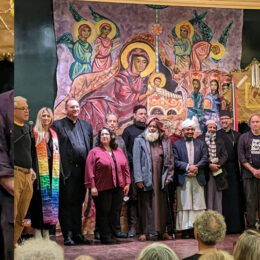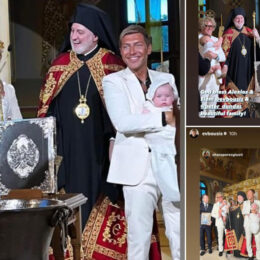A group of progressive female theologians of various faiths in Germany formed a religious group to reflect on their traditions from a feminist perspective.
The Inter-religious Conference of European Women Theologians is a conglomeration of Muslim, Christian and Jewish women who want to take religious interpretation into their own hands, Deutsche Welle reported Tuesday.
“Until now, dialogue among women in the church was kept at the level of exchanging recipes or pouring each other tea,” said Rabeya Muller[German convert to Islam], one of the group’s founders.
more
7 thoughts on “Feminist group to re-think major faiths”
Comments are closed.




I find it amazing that any woman who advocates feminism would convert to Islam.
The status of women under Islam is antithetical to everthing feminism advocates.
Jerry,
Most of the European converts to Islam are women. When interviewed, many of them say they converted because they wanted structure. Without unduly causing offense, I would observe that women tend to prefer structure and routine. The Catholic Church’s debasement of the liturgy and abandonment of the cycle of feasting/fasting (among other practices) has left some women feeling adrift.
They find the answers they are looking for in Islam. The religion basically says to them, “Here are the rules. Do what you are told, and you will be okay.”
Some of them also say that by being Muslim, they are looked at less as sex objects and have reclaimed their ‘personhood.’
All of this points to real problems in Western Christianity, rather (in my opinion) to anything super-attractive about Islam.
Also, the new ‘Muslim’ women are living in countries where their rights are protected by the secular/Christian majority. If they spent a little time in Saudi Arabia or Iran, they might change their minds.
This is all the more reason to expose more Christians to Orthodoxy.
Glen,
In general most western converts to Islam do so because of a need for authoritarian rules. It’s really a search for stability in life.
It still amazes me though that Western European women would still convert to Islam when they have examples like Ayaan Hirsi Al, the Dutch Parliamentarian who is under a sentence of death for her portrayal of Islam in films.
And concerning western Christendom, the problem lies in secularism. Secularism has become a cancer in the western church (both in Protestantism and Rome) that is slowing killing the church’s practices and beliefs. Higher criticism and similar rational theologies have eaten away at its foundations that there is very little to uphold the teachings.
Pope Benedict has called attention to the social ills that have prevailed because of European faith in secularism. And small confessional Protestant groups have tried to lead people away from the altar of indifference. But it may be too little to late.
Islam in Europe is the parasite eating away at the western carcass.
Jerry writes: “And concerning western Christendom, the problem lies in secularism. Secularism has become a cancer in the western church (both in Protestantism and Rome) that is slowing killing the church’s practices and beliefs. Higher criticism and similar rational theologies have eaten away at its foundations that there is very little to uphold the teachings.”
Is the problem really secularism? I mean, the thesis is that as the church becomes secularized, people are attracted to other religions that offer authoritarian rules.
I suppose that may happen in a few cases. But the research I’ve read indicates that the fastest-growing “church” in America is the Church of the Unchurched, so to speak. The ARIS project (American Religious Identity Survey) showed a 10 percent drop between 1990 and 2001 of people who had a church affiliation.
http://www.gc.cuny.edu/faculty/research_studies/aris.pdf
In addition, given a choice between religious, secular, and combinations of the two, only 37 percent of people identified themselves as religious. 38 percent identified themselves as somewhat religious, 16 percent as secular or somewhat secular.
I would argue that to the extent that people are becoming more secular, this is not due to the success of secularism, but to the failure of religion. Stated differently, it’s the job of religion to make the case FOR religion. It’s not enough for religion to “diss” secularism, and then expect people to sign up at church or mosque or synagogue.
As far as higher criticism and other rational approaches to religion, this is the reality of the situation. People no longer believe in talking snakes, large wooden boats holding two of every animal, or a god who orders genocide. Most people have difficulty with even the more garden-variety of miracles. Again, this is the reality of the situation. If you want to have a church that requires literal belief in specific miracles, then you’ve written off virtually two-thirds of the population from the start. If you want to convince people that Genesis was written by Moses and the gospels by four independent eyewitnesses, good luck.
I always find it interesting to hear moans of anguish over the decline of the church in an Eastern Orthodox venue. As far as I can tell, the EO church has virtually no interest in evangelism. Accurate membership figures are hard to come by, but what I’ve read indicates that membership in EO churches is flat. I suspect that without immigration and marriage-related conversion, EO membership would be in decline. The EO church is so small that it typically does not even show up on surveys of religion.
I watch TV, listen to radio, read quite a bit, etc. But I don’t ever remember seeing any TV program that featured an EO speaker. There are no EO radio programs that I know of. EO writers rarely show up in print; Frederica Matthews-Greene is the only one who seems to have any significant distribution.
And even when people go to Orthodox churches there is absolutely no interest in getting them involved in the church. The last few years I’ve gone to two “fall festivals” at Orthodox churches. Everyone is very friendly, the food is good, they show you the church, and then it’s time for you to leave. No interest whatsoever in inviting anyone to a church service. Which is fine, but then a little surprising to hear in an Orthodox discussion that secularism is responsible for the decline of Christianity, when the Orthodox seemingly have so little interest in adding to it.
Now Jim, this is a very good point and one that needs to get us thinking. How do we perform “Orthodox Evangelism” without becoming annoying, or trying to rationalize?
On a personal level, everyone can invite friends to Church one time or the other. We can have good knowledge of our Faith to be able to share it with someone curious enough to ask. (A common question I get is from Catholic friends on our differences and the history involved).
Distribution of our books and leaflets ought to be more widespread, but then again we do not want to end up creating a market where anyone who calls themselves Ortohodox is considered an authority. There has to be quality-control (or accurace/Truth control) if we are to evangelize.
Our Church has always been “disorganized” and “random” in that it has no central authority but power is spread all over each locality. This creates problems in areas where there are few resources.
The IOCC is doing a wonderful job, as are the Monasteries in some parts of our country. But it is up to each community to have a Catechism class, or and “Introduction to Orthodoxy” both for seekers but also for Orthodox to benefit from. We can all read more so we’ll be able to share our beliefs when asked to but also explain our positions and lifestyle in an illumined manner.
We can all have the appropriate reverence and do our Cross before eating also in public places. This is a huge witnessing act in addition to a reverend one.
More ideas?
This is a subject that needs to have us in alert! If we are holders of the Truth we cannot deny sharing it! There are many waiting to hear it! (The unchurched often too!HAve you noticed how strict in their judgement the “unchurched” can be when criticizing Christians? They expect us to be immediately perfect as if through our baptism we are no longer inclined to sin..)
The Orthodox approach to evangelism has always been one of serving the needs of the people you find yourself among. Only secondarily is preaching or cathechism involved. We have to model Christ, fulfill the directives in Matthew to visit the sick and those in prison, feed the hungry, care for the poor. These are the living proofs the truth of what the Church teaches. Unfortunately, most of the time I find that I am so distracted and consumed by my own podvig (daily struggle)that I am unable to do anything else except share verbally.
Note 6
Michael, you have inspired me. You probably don’t know all the good that you do.